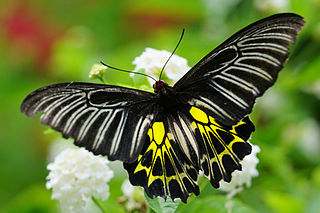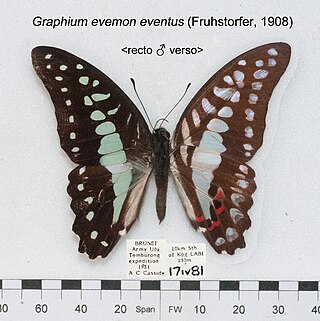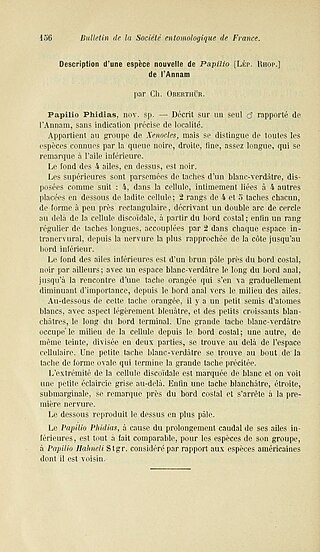
Graphium agamemnon, the tailed jay, is a predominantly green and black tropical butterfly that belongs to the swallowtail family. The butterfly is also called the green-spotted triangle, tailed green jay, or green triangle. It is a common, non-threatened species native to Nepal, India, Sri Lanka through Southeast Asia and Australia. Several geographic races are recognized. The species was first described by Carl Linnaeus in his 1758 10th edition of Systema Naturae.

Graphium nomius, the spot swordtail, is a butterfly found in South and Southeast Asia that belongs to the swallowtail family. The species was first described by Eugenius Johann Christoph Esper in 1793. One of the grandest sights is a host of spot swordtails mud-puddling or swarming around a flowering forest tree.

Papilio nephelus is a species of swallowtail butterfly belonging to the family Papilionidae. Subspecies include P. n. chaon, the yellow Helen, and P. n. sunatus, the black and white Helen.

Troides aeacus, the golden birdwing, is a large tropical butterfly belonging to the swallowtail family, Papilionidae.

Meandrusa sciron, the brown gorgon, is a species of swallowtail butterfly found in parts of South Asia and Southeast Asia. It belongs to the hooked swallowtails genus, Meandrusa, of the family Papilionidae. The brown gorgon is found in India from Sikkim to Assam and north Burma and is not considered to be threatened. Though not uncommon, it is protected under Indian law under the name gyas.

Papilio clytia, the common mime, is a swallowtail butterfly found in south and southeast Asia. The butterfly belongs to the subgenus Chilasa, the black-bodied swallowtails. It serves as an excellent example of a Batesian mimic among the Indian butterflies.

Graphium macareus, the lesser zebra, is a relatively common and not threatened species of swallowtail butterfly found in Southeast Asia. It is also found in parts of India including Assam and Sikkim.

Graphium xenocles, the great zebra, is a swallowtail butterfly found in Southeast Asia which is common and not threatened.

Graphium mandarinus, the spectacle swordtail, which is native to India, is a butterfly of the swallowtail family (Papilionidae). It belongs to subgenus Pazala of the swordtails, that is, genus Graphium.

Graphium eurypylus, the great jay or pale green triangle, is a species of tropical butterfly belonging to the family Papilionidae.

Graphium evemon, the blue jay, lesser jay, or pale green triangle is a species of tropical butterfly found in India, Indonesia, and Malaysia.

Atrophaneura schadenbergi is a species of butterfly in the family Papilionidae. It is endemic to the Philippines.

Graphium codrus is a butterfly of the family Papilionidae, that is found in the Philippines, Celebes and Solomon Islands.

Graphium angolanus, the Angola white lady, is a species of butterfly in the family Papilionidae (swallowtails). It is found in Sub-Saharan Africa.

Papilio torquatus, the torquatus swallowtail, is a swallowtail butterfly in the subfamily Papilioninae. It is found from northern Argentina to Mexico.

Papilio zagreus is a butterfly of the family Papilionidae (swallowtails). It is found in South America, including Venezuela, Colombia, Ecuador, Peru, Bolivia and western Brazil.

Graphium bathycles, the veined jay, is a butterfly in the family Papilionidae, that is found in the Indomalayan realm.

Graphium chironides, the veined jay, is a species of butterfly found in Assam and other parts of Northeast India and Southeast Asia.

Graphium phidias is a species of butterfly in the family Papilionidae (swallowtails). It is found in Laos and Vietnam. Jordan describes it - P. phidias Oberth.Tailed. One of the most interesting butterfly discoveries of recent times, the species being a precursor of the tailless mimetic forms. Wings black with the following white marks: on the forewing five cell-bands placed almost perpendicularly to the hindmargin of the cell, below the cell a broad band divided into longitudinal patches by the black veins, which is continued costad from the 3rd radial by two rows of small spots; between this band and the distal margin a row of linear longitudinal spots, two in each marginal cell: hindwing from the base to the apex of the cell white, with black stripes as in Graphium eurous, distal part of the wing brown-black with small light submarginal spots, double yellow anal spot and before this some small yellow spots; tail narrow,about as long as the distance from the apex of the cell to the distal margin. — Annam. Three males in coll. Oberthur



















